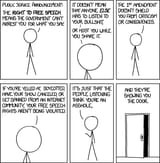Anonymous
9/19/2025, 10:22:49 AM
No.106631747
[Report]
>>106631767
>>106632078
>>106632118
>>106632126
>>106632178
>>106632217
>>106634809
>>106634955
>>106635263
>>106635372
>need to sum sequential array
>memory has 1,2,3,4,5,6,7,8,9,10 in it
>ask programmer
>running sum
>do that, it's 10 ops til I get 55
>ask mathematician
>(n*n+1)/2
>do that, it's 13 ops til I get 55
>neither solutions are correct without dynamic typing, but using it makes real development impossible
Why is programming so shitty?
>memory has 1,2,3,4,5,6,7,8,9,10 in it
>ask programmer
>running sum
>do that, it's 10 ops til I get 55
>ask mathematician
>(n*n+1)/2
>do that, it's 13 ops til I get 55
>neither solutions are correct without dynamic typing, but using it makes real development impossible
Why is programming so shitty?





